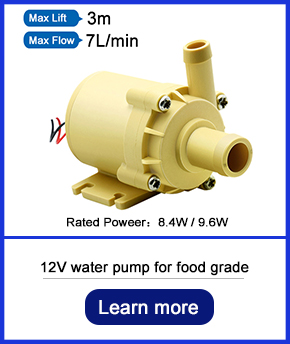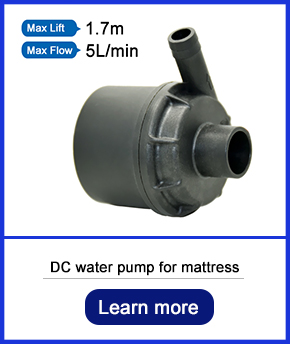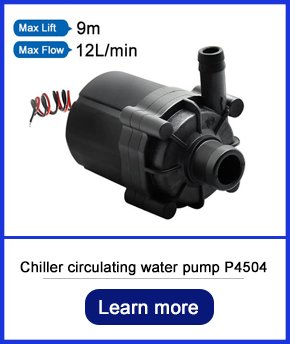The working principle of a 12V water pump is primarily based on the drive of a direct current (DC) motor, which uses a brushless motor and a driver to control the rotation of the pump impeller, thereby achieving the extraction and pressurization of liquid. A 12V water pump is usually driven by a DC power source, such as a car battery or solar panels. It is a small, portable pump widely used in household appliances, automobiles, energy storage, industry, and other fields.
 |  |  |
1. Basic Composition. A 12V water pump mainly consists of the following parts:
- Pump Body: The outer shell of the water pump, usually made of plastic or metal.
- Impeller: Located inside the pump body, it is the power part that generates water flow.
- Motor: The part that provides power to the water pump, usually a DC motor.
- Sealing System: Ensures that the water pump does not leak during operation, usually including mechanical seals or dynamic seal rings.
- Inlet and Outlet Pipes: Pipes that connect the water pump to the water source and the outlet.
2. Working Principle. The working principle of a 12V water pump is based on the basic principles of fluid mechanics, with the following specific steps:
a. Motor Start
When the power supply is connected, the DC motor begins to rotate. The rotation speed of the motor depends on the design of the motor and the voltage of the power supply.
b. Impeller Rotation
The rotation of the motor is transmitted to the impeller through the shaft. The impeller usually has multiple blades, and when the impeller rotates, the blades push the surrounding water molecules, creating centrifugal force.
c. Water Flow Formation
Due to the high-speed rotation of the impeller, the water molecules are subjected to centrifugal force and are pushed to the edge of the impeller, forming a low-pressure area inside the pump body. According to Bernoulli's principle, the fluid will accelerate in the low-pressure area to reduce energy loss.
d. Suction Process
The inlet pipe of the water pump is connected to the water source, and due to the low-pressure area inside the pump body, the external water is sucked into the pump body.
e. Water Delivery Process
As the impeller continues to rotate, water is continuously drawn into the pump body from the inlet, accelerated by the impeller, and then transported to the required location through the outlet pipe.
f. Control of Pressure and Flow Rate
The flow rate and pressure of the water pump can be controlled by adjusting the motor speed or using valves. Increasing the motor speed can increase the flow rate and pressure, while valves can be used to adjust the size of the water flow.
3. Working principles of different types of water pumps.
1) 12v centrifugal pump working principle.
The working principle of a 12V centrifugal pump is to use the rotation of the impeller to activate the centrifugal motion of the liquid. Before starting the 12V centrifugal pump, the pump casing and liquid pipeline must be filled first, and then the motor must be started to drive the impeller and liquid to rotate at high speed to generate centrifugal force. Due to centrifugal force, the liquid is thrown towards the outer edge of the impeller along the blade channel and enters the pressure pipeline outside the pump casing through the volute channel. In a pressure pipeline, the liquid flow rate decreases, the pressure increases, and ultimately is discharged from the pump at a higher pressure. The power consumption is directly proportional to the actual flow rate of the 12V centrifugal pump.
2) 12v micro vacuum pump working principle.
The working principle of the 12v micro vacuum pump is the circular motion of the motor. The diaphragm inside the 12v micro vacuum pump is reciprocated through mechanical equipment, so as to compress and stretch the air in the pump chamber of a fixed volume to form a vacuum (negative pressure), which is at the 12v micro vacuum pump exhaust port. There is a pressure difference between the place and the outside atmospheric pressure. Under the effect of the pressure difference, the gas is pressurized (sucked) into the pump cavity, and then discharged from the exhaust port.
 |  |  |
3) 12v pneumatic diaphragm pump working principle.
The working principle of the 12v miniature pneumatic diaphragm pump is that the motor drives the oscillation of the eccentric wheel and the connecting rod, thereby driving the reciprocating motion of the diaphragm, forming a complete pumping motion with the valve plate of the air inlet and outlet. Not in direct contact with the corrosive material and liquid, and separating the cylinder cavity from the liquid material with a diaphragm is essentially the principle of the reciprocating pump.
4) 12v gear pump working principle.
The working principle of the 12v gear pump is composed of two gears meshing with each other. The teeth of the two gears are separated from each other to form a low pressure, and the liquid is sucked in and sent to the other side by the shell wall. On the other side, the two gears are closed together to form a high pressure to discharge the liquid. It relies on the volume change of the meshing space of the gear teeth to transport the liquid. It belongs to the rotary pump and can also be considered to belong to the positive displacement pump.
4. Special Design. To improve efficiency and adapt to different application scenarios, a 12V water pump may include the following special designs:
- Adjustable Speed Motor: Allows users to adjust the pump speed according to needs to optimize performance.
- Dry Run Protection: Prevents the pump from running for a long time without water, thus avoiding damage.
- Automatic Switch: Automatically starts or stops the pump according to changes in water level or pressure.
5. Application Scenarios. Due to its portability and low energy consumption, a 12V water pump is suitable for various scenarios:
- Automobiles: Used for cooling of automotive motors, electronic controls, and batteries.
- Household Appliances: Used for water heaters, smart toilets, water dispensers, hydronic mattresses, and other pressurized circulation systems.
Address:No.30, Dapu lndustrial Street, Changping, Dongguan, Guangdong, China
Tel: +86-186 7628 8117